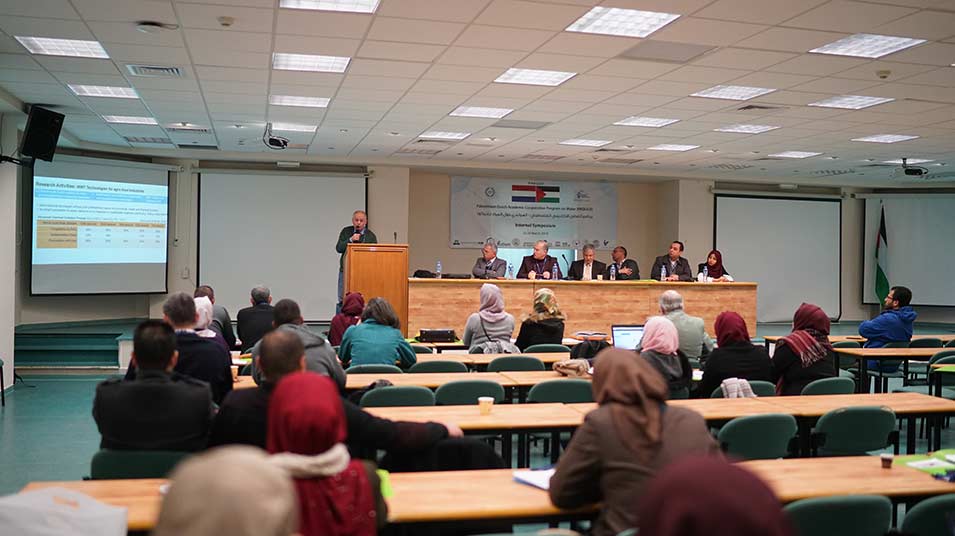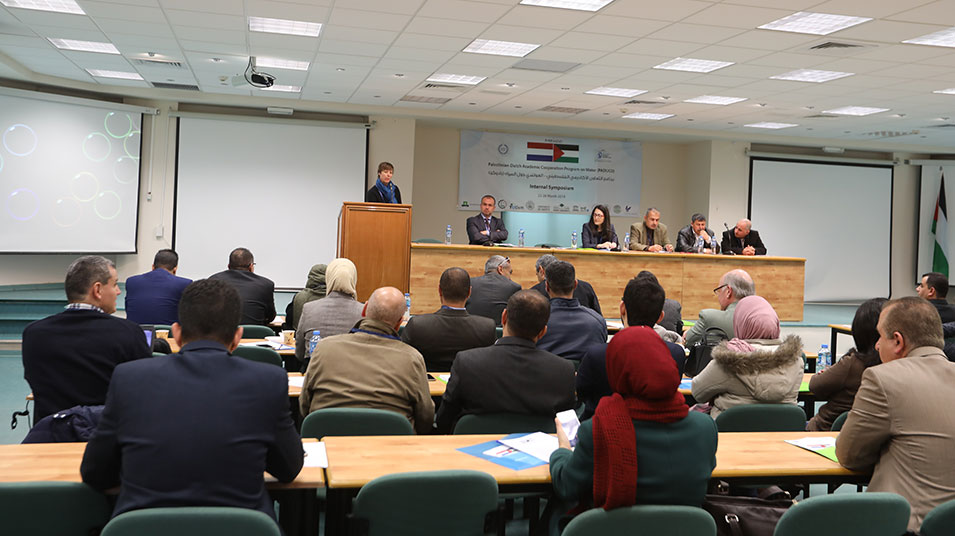Water studies institute celebrates 25 years of Dutch-Palestinian cooperation, highlights prominent projects in symposium
The Palestinian-Dutch Academic Cooperation on Water (PADUCO) organized an internal symposium at Birzeit University on March 25 and 26, 2019. During this event, the Institute of Environmental and Water Studies celebrated the 2019 World Water Day and 25 years of collaboration between Palestinian and Dutch academic and research institutions.
PADUCO is a large consortium that comprises six Palestinian universities (Birzeit, Al-Najah, Al-Quds, Khadoorie, Polytechnic, and Islamic University of Gaza) and five Dutch higher education institutions (Twente, TU-Delft, Wagenninegen, Vrij University of Amsterdam, and IHE-Delft). PADUCO is funded by the Government of the Netherlands through the Netherlands Representative Office in Ramallah.
Attended by a large number of Palestinian and Dutch participants who represented the partner universities, governmental and non-governmental institutions, and the private sector, the two-day symposium presented − in 26 scientific presentations − the progress of 5 integrated and 10 small research projects currently implemented within the PADUCO framework. Based on the 15 ongoing research projects, these presentations concentrated on four main themes: agricultural water demand, industrial wastewater management, water and wastewater treatment, and cross-cutting themes such as gender and governance.
In his opening remarks, Vice President for Community Affairs at Birzeit University Asem Khalil stressed the important role academic and research institutions play in solving the water problems that affect Palestinians because Israel exerts biased, illegal control over Palestine’s natural resources. Khalil added that the longstanding cooperation between the university and Dutch academic institutions is a good model of sustainable and lifelong collaboration between institutions of the Global North and South.
Rashed Al-Sa’ed, director of the Institute of Environmental and Water Studies, emphasized the real-life impact of the projects that were highlighted at the symposium, asserting that they will bring about genuine changes to the life quality of Palestinians.
Floor Nuiten, the deputy head of mission and head of cooperation at Netherlands Representative Office in Ramallah, acknowledged promising recent developments in the water sector in Palestine. She noted that the Palestinian special situation requires an integrated solution that involves universities and research centers, adding that relevant research papers and studies must be translated into actual policies for the benefit of Palestinians.
Gül Özerol, a professor who specializes in the research of sustainability in governance and technology and the PADUCO coordinator at the University of Twente, identified cross-cooperation between national and international academic institutions, sustainable solutions, and targeted training programs and courses as three key areas capable of bringing about change in the water sector in Palestine − if given enough focus.
Hazem Kittaneh, director general of technical affairs at the Palestinian Water Authority, explained that symposia like these help advance sustainable development processes because they rely on extensive cooperation between research centers and educational institutions, the government, and the private sector.
Issam Nofal, director general of the Agricultural Water and Irrigation Department at the Ministry of Agriculture, affirmed that the Palestinian population owns the right to its natural resources and detailed how prevailing Israeli measures negatively affect the Palestinian agriculture sector.
Issa Mousa, director general of the Environment Quality Authority, called for the results and recommendations of the symposium to be drafted into a policy brief that shall advise decision-makers in the Palestinian water sector.
The symposium also featured keynote presentations on the history, current state, and future of PADUCO given by Maher Abu-Madi, the national coordinator of PADUCO; Gül Özerol, the Dutch coordinator of PADUCO; and Subha Ghannam, the water policy officer at the Netherlands Representative Office in Ramallah.
The symposium closed with the attendees reaffirming Palestinians’ rights to their natural resources. They also stressed the importance of collaborative research among various stakeholders − academia, the private sector, civil society institutions, and the government − in efforts to find sustainable solutions to the numerous problems affecting the Palestinian water sector. Finally, they highlighted the need for increased funding to Palestinian research institutions to enable them to implement projects with a positive impact on Palestinian communities.








